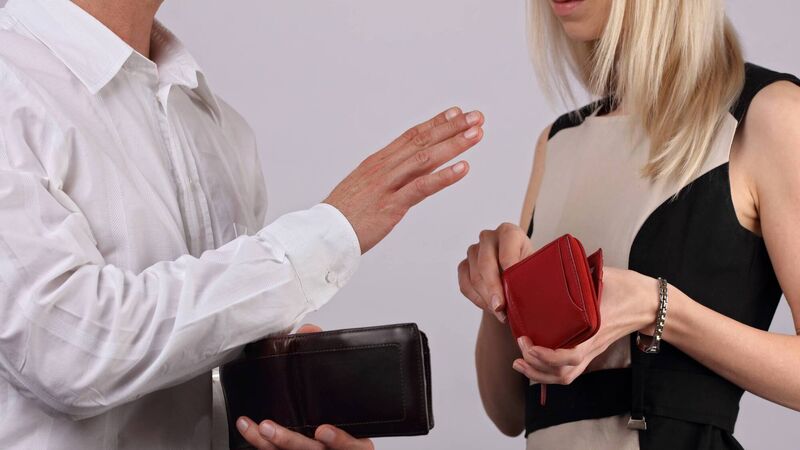First date: who should pay the bill?

PICTURE the scene. My oldest friend is on a first date. The bill has just arrived and he is suggesting, without hesitation or embarrassment, that they split it.
Pretty commonplace scenario? In this age of gender equality, when a woman may be earning as much, if not more than a man, only fair, right?
My friend’s horror at his suggestion took even her by surprise.
“It was like I couldn’t breathe. I felt so humiliated, searching through my bag for €30. I thought I’d be OK with it but the experience of it was something else entirely. I felt it in my stomach. A visceral reaction of disgust.”
As a feminist, I push her to explain — genuinely interested in what this successful, intelligent woman has to say.
“A woman deserves to be treated. I wanted him to be a gentleman. It just felt wrong and if this is how he behaves on a first date, then what would he be like in six months!”
I don’t argue much. Theory or opinion won’t help. She just keeps on saying “it is different when you experience it in reality” and again, and again, “it just felt wrong”.
This conversation has lingered in my head for days. To her, it felt wrong and she certainly won’t be going on a second date with the guy.
But there is something so interesting in her reaction, in the fact that she agrees with splitting the bill in theory but not in practice.
French philosopher Simone de Beauvoir tells us ‘One is not born, but rather becomes, a woman.’ What does she mean? She means that gender identity is formed by the world around us.
She is spot on. My friend felt the splitting of the bill was wrong because it is still ‘the norm’ for women to get dressed up and for men to pay for their attention. That might sound crass, overly transactional, but it is true.
Women spend money on beauty products, treatments and flattering clothes and men offer to buy drinks or dinner, if they are indeed ‘gentlemen’.
The interesting point is that women perpetuate this as much as, if not more, than men. This guy on his first date is happy to promote a cultural change. He is offering to split the bill and is respecting my friend as an equal in a very real and fiscal sense. But my friend is horrified. Why?
Because her identity as a woman is about deserving to be ‘treated’ to a meal. She is worried that she is less valued than other women who are being bought dinners and presents wrapped in ribbons. So, is it actually women who want to keep the traditional roles going, and not men?
The Equal Rights Amendment is yet to be passed in the U.S. It is back in the headlines after a 36- year hiatus. It was developed in 1974 as an amendment to the Civil Rights Act, to include prohibition of discrimination on the basis of sex. There was initially no political push against it. But then came the cultural one, led by a woman — Phyllis Schlafly. A conservative, she commented: “Let’s not permit this tiny minority to degrade the role that most women prefer, we cannot deny the woman’s right to be supported by her husband”.
To Schlafly and her supporters, feminism was a threat. It threatened their identity, as mothers and wives — an identity that is not without merit and advantage.
Exactly the same thing is happening with my friend. And I don’t blame her for a second. If you are told something from birth, it doesn’t make sense to go against it, it will just ‘feel wrong.’
So, what next? I’m not sure. I constantly hear women, not men, laughing about their husband’s inability to handle a kid’s birthday party or the school lunches. I have even made those jokes myself! Why? Because we are all just trying to get by and fit in and feel normal in our communities. And some of us like those roles.
We have ‘become’ the women we see around us, as de Beauvoir says. These roles are absolutely valid and worthwhile. But there are darker consequence to these norms that are far from OK. The fact that this ‘caring’ role women defend is ultimately under-paid and under-recognised, even though it is extremely demanding. The pressure that a focus on appearance places on young girls. The incidences of male violence and male suicide that stem from men having to be traditional ‘providers’, still to be ‘obeyed’ or ‘in control’ in some way.
Men and women are suffering when we take them too far, which is why feminism is relevant for us all.
Ultimately, the only conclusion I can come to is we need to communicate better with each other. We need to be less judgemental, to recognise that a call for equality does not mean we all must choose the same path but that we should have a choice. That everything deserves a conversation.
If my friend wants her date to pay the bill, she needs to say so, and they can go from there. If he refuses, they should walk away from each other for good. It probably won’t work. But what if this guy was actually right for her? What if this couple on a first date are the victims of a world that is confused about the most basic of questions — who should pay the bill?







 App?
App?


